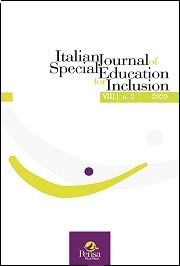Insegnamento dello strumento musicale e inclusione scolastica: una ricerca nazionale
DOI:
https://doi.org/10.7346/sipes-02-2020-11Abstract
In the perspective of a gradual improvement of school inclusion, music is considered a strategic
exeprience to effectively respond to the needs of pupils with disabilities and specific learning
disorders (SLD). In Italian schools, music is present in the nursery school and in the first cycle of
education. It allows to positively face the challenge of inclusion by promoting a development
that integrates linguistic, cognitive, motor, and socio-affective aspects, by motivating participation
to collective activities and by helping to build respect for differences. Currently, in the first
cycle school, the access of students with disabilities and SLD to musical instrument courses in
music secondary schools (SMIM) is a particularly controversial issue since an elitist vision of music
teaching is still working and, in fact, it excludes these students. In this framework, this paper
presented a national research aimed, in one hand, to explore the practices of assessment and
teaching for students with disabilities and with SLD widespread in SMIM and, in the other hand,
to identify "essential guidelines" for the construction of a inclusive models of instrumental
teaching.


